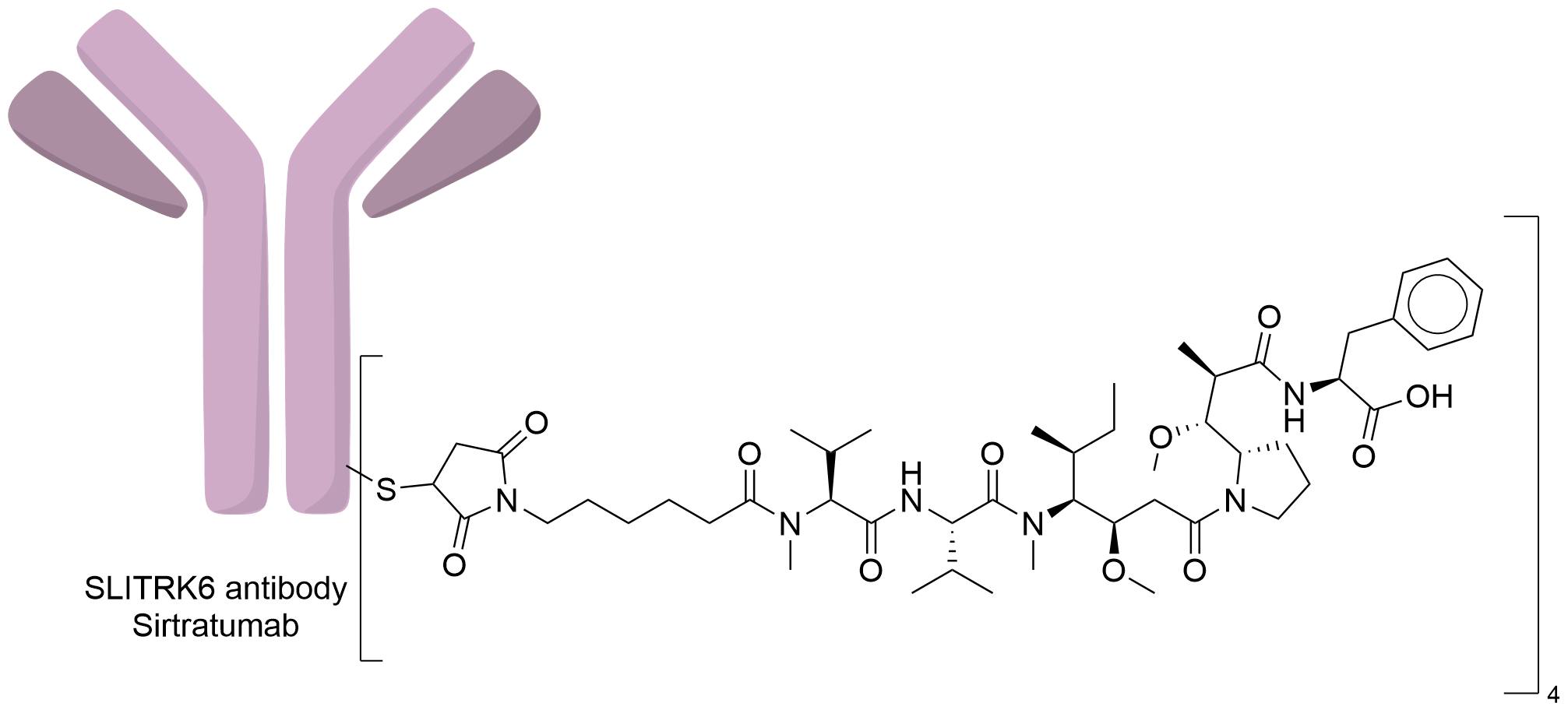Antibody-drug Conjugate Information
General Information of This Antibody-drug Conjugate (ADC)
| ADC ID |
DRG0YJCVC
|
|||||
|---|---|---|---|---|---|---|
| ADC Name |
ASG-15MF
|
|||||
| Synonyms |
ASG-15MF; AGS-15MF; ASG 15MF; ASG15MF
Click to Show/Hide
|
|||||
| Drug Status |
Investigative
|
|||||
| Indication |
In total 2 Indication(s)
|
|||||
| Drug-to-Antibody Ratio |
4
|
|||||
| Structure |

|
|||||
| Antibody Name |
Sirtratumab
|
Antibody Info | ||||
| Antigen Name |
SLIT and NTRK-like protein 6 (SLITRK6)
|
Antigen Info | ||||
| Payload Name |
Monomethyl auristatin F
|
Payload Info | ||||
| Therapeutic Target |
Microtubule (MT)
|
Target Info | ||||
| Linker Name |
Maleimido-caproyl
|
Linker Info | ||||
| Conjugate Type |
Inter-chain cysteine.
|
|||||
| Combination Type |
Mafodotin
|
|||||
General Information of The Activity Data Related to This ADC
Discovered Using Patient-derived Xenograft Model
Discovered Using Cell Line-derived Xenograft Model
Full List of Activity Data of This Antibody-drug Conjugate
Discovered Using Patient-derived Xenograft Model
| Experiment 1 Reporting the Activity Date of This ADC | [1] | ||||
| Efficacy Data | Tumor Growth Inhibition value (TGI) | ≈ 62.90% (Day 17) | High SLITRK6 expression (SLITRK6+++; IHC H-score=250) | ||
| Method Description |
PDX models were established by subcutaneous implantation of xenograft fragments (AG-B7 or AG-B8) in the flanks of SCID mice. When the tumor volume reached approximately 200 mm3,ASG-15MF was dosed at 0.25 mg/kg,2x per week i.v in AG-B8 PDX model. The last dose was given on day 14.
|
||||
| In Vivo Model | Bladder cancer PDX model (PDX: AG-B8) | ||||
| Experiment 2 Reporting the Activity Date of This ADC | [1] | ||||
| Efficacy Data | Tumor Growth Inhibition value (TGI) | ≈ 63.40% (Day 25) | High SLITRK6 expression (SLITRK6+++; IHC H-score=230) | ||
| Method Description |
PDX models were established by subcutaneous implantation of xenograft fragments (AG-B7 or AG-B8) in the flanks of SCID mice. When the tumor volume reached approximately 200 mm3,ASG-15MF was dosed at 0.5 mg/kg,2x per week i.v in AG-B7 PDX model. The last dose was given on day 21.
|
||||
| In Vivo Model | Bladder cancer PDX model (PDX: AG-B7) | ||||
| Experiment 3 Reporting the Activity Date of This ADC | [1] | ||||
| Efficacy Data | Tumor Growth Inhibition value (TGI) | ≈ 80.00% (Day 17) | High SLITRK6 expression (SLITRK6+++; IHC H-score=250) | ||
| Method Description |
PDX models were established by subcutaneous implantation of xenograft fragments (AG-B7 or AG-B8) in the flanks of SCID mice. When the tumor volume reached approximately 200 mm3,ASG-15MF was dosed at 0.5 mg/kg,2x per week i.v in AG-B8 PDX model. The last dose was given on day 14.
|
||||
| In Vivo Model | Bladder cancer PDX model (PDX: AG-B8) | ||||
Discovered Using Cell Line-derived Xenograft Model
| Experiment 1 Reporting the Activity Date of This ADC | [1] | ||||
| Efficacy Data | Tumor Growth Inhibition value (TGI) | ≈ 35.20% (Day 21) | Moderate SLITRK6 expression (SLITRK6++; IHC H-score=185) | ||
| Method Description |
CDX models were established by subcutaneous injection of between 2 and 10 million SW780, RT4 (ATCC) or NCI-H322M (NCI) cells in SCID mice. ASG-15MF was administered twice weekly at 3 mg/kg (n = 6) starting when the tumor volume reached approximately 200 mm3.
|
||||
| In Vivo Model | NCI-322M CDX model | ||||
| In Vitro Model | Lung cancer | NCI-322M cells | Homo sapiens | ||
| Experiment 2 Reporting the Activity Date of This ADC | [1] | ||||
| Efficacy Data | Tumor Growth Inhibition value (TGI) | ≈ 81.30% (Day 30) | High SLITRK6 expression (SLITRK6+++; IHC H-score=280) | ||
| Method Description |
CDX models were established by subcutaneous injection of between 2 and 10 million SW780, RT4 (ATCC) or NCI-H322M (NCI) cells in SCID mice. When the tumor volume reached approximately 230 mm3, a single dose of ASG-15MF, 5 mg/kg intravenously, was administered intravenously (iv) to the mice.
|
||||
| In Vivo Model | Bladder cancer CDX model | ||||
| In Vitro Model | Bladder cancer | Bladder cancer cells | Homo sapiens | ||
References
